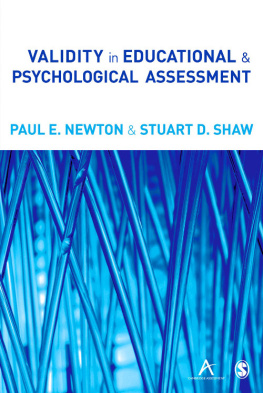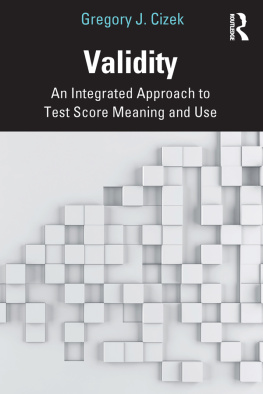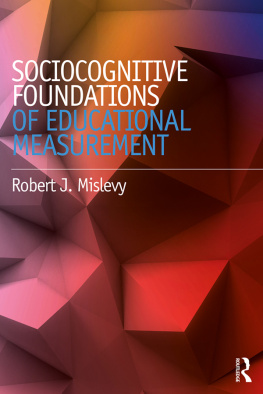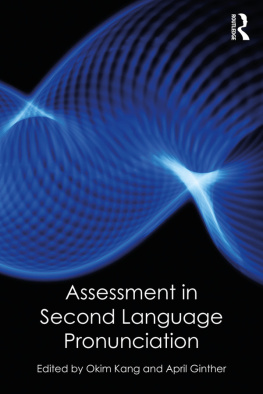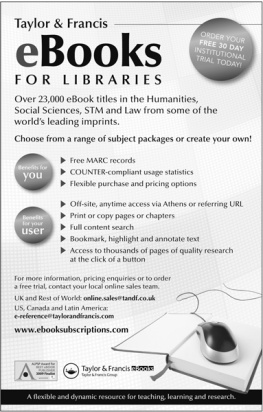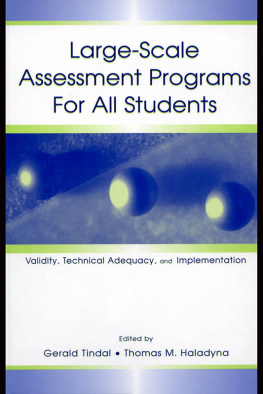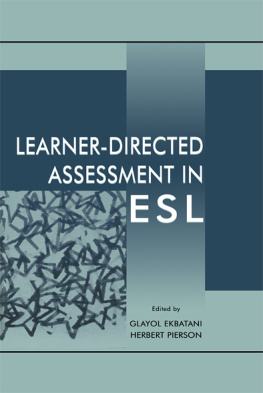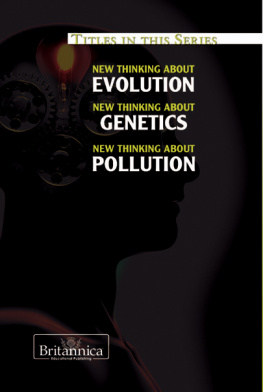



Established over 150 years ago, Cambridge Assessment operates and manages the Universitys three exam boards and carries out leading-edge academic and operational research on assessment in education. It is a not-for-profit organisation developing and delivering educational assessment to eight million candidates in 170 countries every year.

UNIVERSITY of CAMBRIDGE
Local Examinations Syndicate
Cambridge Assessment is the brand name of the University of Cambridge Local Examinations Syndicate, a department of the University of Cambridge. Cambridge Assessment is a not-for-profit organisation.
Cambridge Assessment
Paul E. Newton and Stuart D. Shaw have asserted their right under the Copyright, Designs and Patents Act, 1988, to be identified as Authors of this Work
First published 2014
Apart from any fair dealing for the purposes of research or private study, or criticism or review, as permitted under the Copyright, Designs and Patents Act, 1988, this publication may be reproduced, stored or transmitted in any form, or by any means, only with the prior permission in writing of the publishers, or in the case of reprographic reproduction, in accordance with the terms of licences issued by the Copyright Licensing Agency. Enquiries concerning reproduction outside those terms should be sent to the publishers.
Library of Congress Control Number: 2013946019
British Library Cataloguing in Publication data
A catalogue record for this book is available from the British Library
ISBN 978-1-4462-5322-9
ISBN 978-1-4462-5323-6

SAGE Publications Ltd
1 Olivers Yard
55 City Road
London EC1Y 1SP
SAGE Publications Inc.
2455 Teller Road
Thousand Oaks, California 91320
SAGE Publications India Pvt Ltd
B 1/I 1 Mohan Cooperative Industrial Area
Mathura Road
New Delhi 110 044
SAGE Publications Asia-Pacific Pte Ltd
3 Church Street
#10-04 Samsung Hub
Singapore 049483
Published in association with:
Cambridge Assessment
1 Hills Road
Cambridge
CB1 2EU
Editor: Marianne Lagrange
Editorial assistant: Rachael Plant
Project manager: Sharon Cawood
Production editor: Thea Watson
Copyeditor: Lisa Cordaro
Proofreader: Jill Birch
Indexer: Avril Ehrlich
Marketing manager: Catherine Slinn
Cover designer: Naomi Robinson
Typeset by: C&M Digitals (P) Ltd, Chennai, India
Printed in India by Replika Press Pvt Ltd
ABOUT THE AUTHORS
Paul E. Newton is Professor of Educational Assessment at the Institute of Education, University of London. His research focuses primarily on issues related to the evaluation of large-scale educational assessment systems, and he is particularly interested in theories of validity for educational and psychological measurement, past and present. He has published on a range of assessment topics including validity, comparability, assessment purposes, national curriculum test reliability and public understanding of measurement inaccuracy.
Having obtained a PhD in developmental psychology, Paul moved into educational assessment and has spent most of his career as a researcher within a range of assessment agencies, including the Associated Examining Board, National Foundation for Educational Research, Qualifications and Curriculum Authority, Ofqual and Cambridge Assessment.
Paul is a member of the Editorial Board of the international journal Assessment in Education: Policy, Principles and Practice, and has served on a variety of national and international committees including the Executive Committee of the International Association for Educational Assessment. He was a member of the Assessment Reform Group until its retirement in 2010, and is a Fellow of the Association for Educational Assessment in Europe.
Stuart D. Shaw has worked for Cambridge Assessment since January 2001, where he is particularly interested in demonstrating how Cambridge Assessment seeks to meet the demands of validity in its assessments. Before leading a research team in the area of mainstream international examinations, Stuart worked on a range of Cambridge English products with specific skill responsibilities for assessing writing. He has experience in the areas of researching and managing English second language writing assessment; developing, revising and introducing assessment procedures for new testing scenarios, and disseminating good practice to others through mentoring, lecturing and informal advice; and establishing criteria for good practice in the type of public examination offered by Cambridge English and Cambridge International Examinations.
Stuart has a wide range of publications in English second language assessment and educational research journals. He is a Fellow of the Association for Educational Assessment in Europe, and a Fellow of the Chartered Institute of Educational Assessors.
ACKNOWLEDGEMENTS
In bringing this book to completion, we were reminded constantly of our indebtedness to a great many individuals. Their encouragement, forbearance and expert engagement undoubtedly has contributed to the quality and value of the work. In the course of researching and writing the book, we engaged with numerous measurement and assessment specialists and although on occasions we have contended with them, we hope we have done so without being unduly contentious.
Our first debt of gratitude is to Val Klenowski (Queensland University of Technology) and Constant Leung (Kings College London) for their insightful and encouraging reviews of the manuscript.
We owe an equal debt to a number of specialists in the field of educational and psychological testing who provided expert input and reflection on individual chapters: Paul Warwick (University of Cambridge) and Isabel Nisbet (Cambridge International Examinations) who reviewed ; and Gordon Stobart (Institute of Education, University of London) who reviewed a number of chapters. We gladly acknowledge our gratitude to them for their universally insightful and useful comments.
We are particularly indebted to the Validity Advisory Group, which was established with the support of the business streams that comprise Cambridge Assessment, for supporting the development of the text and reviewing chapters: Tim Oates (Chair, Cambridge Assessment), Beth Black (Oxford Cambridge and RSA Examinations), Neil Jones (Cambridge English), Paul Beedle (Cambridge International Examinations) and Victoria Crisp (Cambridge Assessment).
We are also indebted to the decision-makers within Cambridge Assessment, particularly Tim Oates, who supported the project and allowed time to be committed to it. In addition, as the first author relocated during the writing of the book, we are similarly indebted to those at the Institute of Education who supported its completion.
The academic research community in Cambridge Assessment has been a source of great support and intellectual invigoration. Many colleagues have contributed to the book by sharing their time, resources and knowledge. We extend special thanks to Anthony Dawson (Cambridge International Examinations), Nick Saville (Cambridge English), Phineas Hodson (Cambridge International Examinations) and Tom Bramley (Cambridge Assessment) for their judicious and perceptive observations and analyses. The book is considerably stronger in light of their skills and expertise.
Next page
